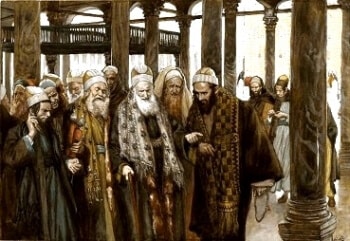
Seven-year-old Jason was struck by what the priest said at the Ash Wednesday service: “Dust you are, and to dust you shall return.” That night, as he knelt down to pray, he noticed piles of dust under his bed. Calling to his mother he said, “Come here; someone is either coming or going, I don’t know which.”
Lent begins with the sobering reminder that we came from the the earth and it won’t be long before we return back there. We read in Genesis that God took clay from the ground and breathed life into it, and thus Adam was born. Leave the breath of God out of the picture and all you have is a lump of clay. When we lose this perspective on ourselves and begin to imagine ourselves on a pedestal, we become trapped in the same sin that brought the devil down, pride.
Jesus warned his disciples against pride by using the scribes and the Pharisees as “props.” These religious leaders reeked with pride, even though they saw themselves as God-like. (Matthew 23:1-12).
“The scribes and Pharisees have taken their seat on the chair of Moses. Therefore, do and observe all things whatsoever they tell you, but do not follow their example. For they preach but they do not practice.”
Sitting on the chair of Moses made this group feel they were superior to the rest of the people. In reality, however, we are told that Moses was the “humblest man on earth.” Jesus told his disciples to respect religious leaders and observe what they say, but not to imitate their example.
“They tie up heavy burdens hard to carry and lay them on people’s shoulders, but will not lift a finger to move them.”
As slave owners justify their harsh treatment of subordinates by saying that slaves are sub-human, so the religious leaders burdened people with excessive religious requirements because they saw them as a “less than” class of people who needed demanding rules and regulations. At the same time the leaders considered themselves exempt from such burdens.
“All their works are performed to be seen. They widen their phylacteries and lengthen their tassels. They love places of honor at banquets, seats of honor in the synagogues, greetings in the marketplaces, and the salutation ‘Rabbi.’”
These leaders reinforced the belief that they were of superior quality to others, by exaggerating the appearance of their religious clothes, gloating in their privilege of having seats of honor, and soaking in the applause which people were expected to give them when they walked into the synagogues and shopping centers. So, they nurtured their own pride and false self-esteem.
Jesus promoted humility among his disciples. He led by example. Though he was the Son of God, he chose to live as a poor man and associate himself with the sinners, the poor, and outcasts. Instead of presenting himself as superior to others, he acted as their servant.
“Whoever exalts himself will be humbled; but whoever humbles himself will be exalted.”
On the other hand, humility is not low self-esteem. It is not looking down on ourselves as though we are worthless. Nor is it pretending to be humble and hiding the gifts God gave us, so others will admire us. Remember Mary, our model of humility, who said, “All generations shall call me blessed.” She did not deny her greatness in the sight of God. At the same time she said, “He who is mighty has done great things for me.” It is the breath of God that gives us our dignity and importance.
